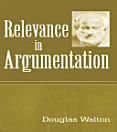Argumentation Schemes for Presumptive Reasoning
nov 2013 · Routledge
Ebook
232
pagine
family_home
Idoneo
info
reportValutazioni e recensioni non sono verificate Scopri di più
Informazioni su questo ebook
Recent concerns with the evaluation of argumentation in informal logic and speech communication center around nondemonstrative arguments that lead to tentative or defeasible conclusions based on a balance of considerations. Such arguments do not appear to have structures of the kind traditionally identified with deductive and inductive reasoning, but are extremely common and are often called "plausible" or "presumptive," meaning that they are only provisionally acceptable even when they are correct. How is one to judge, by some clearly defined standard, whether such arguments are correct or not in a given instance? The answer lies in what are called argumentation schemes -- forms of argument (structures of inference) that enable one to identify and evaluate common types of argumentation in everyday discourse.
This book identifies 25 argumentation schemes for presumptive reasoning and matches a set of critical questions to each. These two elements -- the scheme and the questions -- are then used to evaluate a given argument in a particular case in relation to a context of dialogue in which the argument occurred.
In recent writings on argumentation, there is a good deal of stress placed on how important argumentation schemes are in any attempt to evaluate common arguments in everyday reasoning as correct or fallacious, acceptable or questionable. However, the problem is that the literature thus far has not produced a precise and user-friendly enough analysis of the structures of the argumentation schemes themselves, nor have any of the documented accounts been as helpful, accessible, or systematic as they could be, especially in relation to presumptive reasoning. This book solves the problem by presenting the most common presumptive schemes in an orderly and clear way that makes them explicit and useful as precisely defined structures. As such, it will be an indispensable tool for researchers, students, and teachers in the areas of critical thinking, argumentation, speech communication, informal logic, and discourse analysis.
This book identifies 25 argumentation schemes for presumptive reasoning and matches a set of critical questions to each. These two elements -- the scheme and the questions -- are then used to evaluate a given argument in a particular case in relation to a context of dialogue in which the argument occurred.
In recent writings on argumentation, there is a good deal of stress placed on how important argumentation schemes are in any attempt to evaluate common arguments in everyday reasoning as correct or fallacious, acceptable or questionable. However, the problem is that the literature thus far has not produced a precise and user-friendly enough analysis of the structures of the argumentation schemes themselves, nor have any of the documented accounts been as helpful, accessible, or systematic as they could be, especially in relation to presumptive reasoning. This book solves the problem by presenting the most common presumptive schemes in an orderly and clear way that makes them explicit and useful as precisely defined structures. As such, it will be an indispensable tool for researchers, students, and teachers in the areas of critical thinking, argumentation, speech communication, informal logic, and discourse analysis.
Valuta questo ebook
Dicci cosa ne pensi.
Informazioni sulla lettura
Smartphone e tablet
Installa l'app Google Play Libri per Android e iPad/iPhone. L'app verrà sincronizzata automaticamente con il tuo account e potrai leggere libri online oppure offline ovunque tu sia.
Laptop e computer
Puoi ascoltare gli audiolibri acquistati su Google Play usando il browser web del tuo computer.
eReader e altri dispositivi
Per leggere su dispositivi e-ink come Kobo e eReader, dovrai scaricare un file e trasferirlo sul dispositivo. Segui le istruzioni dettagliate del Centro assistenza per trasferire i file sugli eReader supportati.








